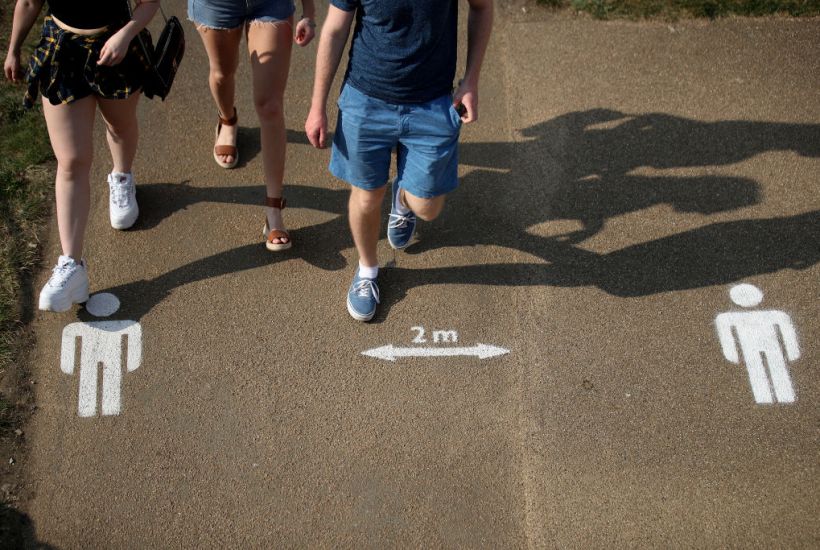Open or close? Open the schools and close the pubs? Open bowling alleys but not skating rinks? Allow open restaurants but not wedding receptions? Britain is playing musical chairs with different services and businesses, but the whole game is misguided and without any scientific epidemiological basis. To open society gradually is certainly wise, but how do we pick one over another?
Covid-19 is a terrible disease, and the primary goal should be to minimise deaths. How is this done? The key is age. The risk of Covid-19 mortality varies more than a thousandfold between the oldest and youngest members of society.
The pandemic will not be over until we reach herd immunity, either through a vaccine or through natural infections. Herd immunity is not a strategy but a proven scientific phenomenon, and to deny that is as silly as denying gravity. With the right strategy, we can even use it to save lives.
Under the vaccine scenario, the right strategy is to protect the elderly and other high-risk groups until they are protected by herd immunity, while the younger generations keep society afloat. Under the second scenario of natural immunity, the right strategy is to protect the elderly and other high-risk groups until they are protected by herd immunity, while the younger generations keep society afloat. If these two strategies sound about the same, they are.
How does herd immunity work? As more people obtain immunity, it gets harder for the virus to find new people to infect, and the epidemic will eventually die out before everyone is infected. It is not known how big the group of infected people must be for herd immunity to kick in, but it is some percentage of the population. If there are many older people in this group, mortality will be high. If most of them are young, there will be few deaths. In fact, as stated by the world’s foremost infectious disease epidemiologist, herd immunity is ‘the only way we can reduce the risk to the vulnerable people in the population’.
Back to the musical chairs. With this in mind, we could open skating rinks that are mainly used by younger people, but not the bowling alleys, with their older clientele. That would be a small step in the right direction, but to minimise mortality, one must go all-in for the age-based strategy. We must do the opposite of what was done last spring, when schools were closed while sick patients were sent to nursing homes.
So yes, we can open schools, but teachers older than 60 should work from home, where they can help by grading exams and essays. Yes, keep the pubs open, but those in their 70s should stay away for a while. Yes, open the bowling alleys, but skip the senior league. Yes, let kids skate with their parents, but record their pirouettes for grandparents to watch at home. And yes, open all restaurants, but only offer take-out to older folks. The point is, open society for the younger generations, and when they have generated herd immunity with only modest risks to themselves, older people can come out as well.
Is it age discrimination when the old are asked to forego society for a while, while the young go about their lives? Maybe, but it saves lives. Is it age discrimination when young people take the small risks needed to protect the older more vulnerable members of society? Yes, for sure, but prior generations took much larger risks. As a society we should appreciate young adults who help generate herd immunity by living normal lives and keeping society afloat. Thank you, thank you, thank you. When people throw misguided complaints at you, falsely claiming that you are endangering others, remember that the opposite is true. Also, think of your grandfather. While risking his life fighting in World War II, he had much worse things thrown at him.
What about the children? While young adults can decide what risks to take, it is unethical to impose unwarranted risks on children. Are they safe if the schools reopen? The answer is yes.
With passionate discussions about opening schools, it is good to step back, take a deep breath, and examine what science tells us. To know the effect of smoking, we study smokers. To know the effects of vaccines, we study those vaccinated. Similarly, to know the effects of keeping schools open during the Covid-19 pandemic, we must study the one place that kept their schools open during the height of the pandemic. That place is Sweden.
Sweden never closed day-care centres or schools for its 1.8 million children ages one to 15. Of these children, zero died from Covid-19. The total number of cases is unknown, but the reported number is 468, which is 25 per 100,000. Of these 468 children, eight were hospitalised in an intensive care unit. This means that, whether schools are open or not, children are less at risk from Covid-19 than from influenza, which kills an average of 40-50 children in England and Wales each year. In contrast to influenza, schools are not driving the Covid-19 pandemic, and in Sweden, teachers had the same Covid-19 risk as the average risk among other professions.
It is inappropriate to either exaggerate or dismiss the seriousness of the Covid-19 pandemic. It is still impossible to know what percentage is needed to reach herd immunity or how many people will eventually die, and no respectable epidemiologist will make such claims. Nor do we know how long it will take to get a vaccine, which could be anything from six months to never. The one important thing that we do know is the enormous risk difference by age. Covid-19 is a formidable enemy, and in any war, one must take advantage of the opponent’s weaknesses. That weakness is the near inability of the virus to kill younger people. Hence, it is the young adults among us that must stand in the front line as we fight this enemy. If not, we will have many more casualties than necessary.
Martin Kulldorff is a professor of medicine at Harvard Medical School. He studies infectious disease outbreaks and vaccine safety. On Twitter, he can be found @MartinKulldorff
Got something to add? Join the discussion and comment below.
Get 10 issues for just $10
Subscribe to The Spectator Australia today for the next 10 magazine issues, plus full online access, for just $10.




















Comments
Don't miss out
Join the conversation with other Spectator Australia readers. Subscribe to leave a comment.
SUBSCRIBEAlready a subscriber? Log in